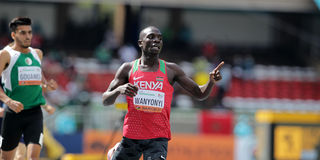Why athletics academy can help to sustain dominance

Kenya's Emmanuel Wanyonyi reacts after winning Heat 1 of men's 800 metres semi-finals during the World Athletics Under-20 Championships at Moi International Sports Centre, Kasarani on August 21, 2021.
The Olympic Games is the ultimate theatre for sports. The quadrennial event presents the perfect stage for talented and well-drilled performers to showcase the finest attributes of their trade. The best in various disciplines convene for intense sporting activities to win medals that signify victory and elevate them above the rest.
Kenya’s performance at the 2020 Tokyo Olympics was unsatisfactory, even though the country topped Africa on the medal table. It fell short of the 2016 Rio Games standards. The saddest moment was when it was painfully stripped of the men’s 3,000 metres steeplechase title by Moroccan Soufiane El Bakkali after an enviable 53-year stranglehold of the race.
But that was expected as there has been a noticeable shortage in supply of elite steeplechase runners in the past five years. Since Rio, the country’s hold on the steeplechase at the global stage was clearly threatened. Unfortunately, it appears nothing much was done to cushion the country from that threat.
In 2019, Conseslus Kipruto won by a desperate head dip at the finish line against Ethiopian Lamecha Girma in Doha, Qatar, during the World Athletics Championships. It was a warning sign of what to expect. The inevitable finally occurred in Tokyo.
Although after Kenya restored order in the race in the Under-20 championships, held in Nairobi weeks after the Olympics, raised the spirits, the national pride in this field has been significantly punctured.
Lack of mentorship
The underperformance in the races points to a lack of mentorship. We are struggling to transfer athletics skills from former superstars to upcoming runners. There must be a structured way to pass that knowledge and skills to the next generation.
Athletics talent is in huge supply, especially in the middle- and long-distance running. But for optimum performance, it must be nurtured, sharpened and spiced with the latest training techniques and best methods. For upcoming athletes, learning from the best should be a constant feature in their endeavour to follow in their steps and even do better.
Great steeplechasers like Kipchoge Keino and Ezekiel Kemboi and marathoners Eliud Kipchoge, Catherine Ndereba and Mary Keitany should be facilitated to spend ample time and share their skills with the juniors in a mentorship academy. They can also write manuals and insightful books on their successful exploits to be studied in the academy.
The Ministry of Sports should establish the academy but let the National Olympics Committee of Kenya or Athletics Kenya manage it under its close supervision. The two bodies should also be tasked with scouting for talented youngsters to be admitted to the academy and come up with a curriculum and agree on the period of study in the academy.
Kenya should always take the best to the Olympics. Three years are adequate to fine-tune the talented sportsmen and women the country is endowed with for the next cameo in Paris, France, in 2024.
Mr Kiplang’at is a communications consultant. [email protected].





